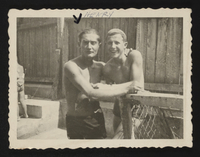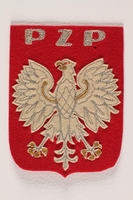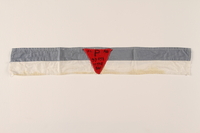Overview
- Brief Narrative
- Silver-plated engraved axe and sword shaped letter opener awarded to Henryk Zguda before the war when he was a competitive swimmer with the YMCA (Young Men's Christian Association.) The opener was made by Emil Goldwasser, a prominent jeweler in Krakow. Goldwasser's daughter was in Auschwitz when Henryk was. One night, Henryk and his friend, Kazio snuck into the women's camp to visit her and take her supplies. Kazio was a skilled trader and paid the guards to not shoot. He and Henryk used an open barrel to hold up the electric fence and to crawl through. Henryk, a 25 year old Catholic, was arrested in occupied Krakow by the German SS on May 30, 1942. On June 15, Henryk was deported to Auschwitz concentration camp. He was given a red triangle with the letter P to identify him as a political prisoner. He was transferred to Buchenwald on March 12, 1943, where he worked in the stone quarry. In spring 1945, Buchenwald was evacuated and, on April 10, Henryk was forced on a death march to Dachau. He was liberated by American troops on April 29. Henryk was hospitalized and then sent to Neu Freimann displaced persons camp. He returned to Krakow in 1946.
- Date
-
received:
before 1939 September
- Geography
-
received:
Krakow (Poland)
- Credit Line
- United States Holocaust Memorial Museum Collection, Gift of Nancy Zguda
- Contributor
-
Subject:
Henry Zguda
- Biography
-
Henryk Zguda was born on July 12, 1917, in Krakow, Poland, to Catholic parents, Wincenty and Karolina Zguda. Wincenty fought for the Austrian Army in World War I (1914-1918). In 1918, he returned to Krakow with malaria. He had a seizure and was taken to a hospital in Berlin where he died. Henryk and Karolina lived in a two room apartment with five other family members. After Karolina got a job at the state tobacco factory, they moved to their own apartment. In 1933, Henryk joined the Youth Men’s Christian Association (YMCA), where he swam and played water polo competitively. He dropped out of school in 1935 to work full time for the Emil Freege seed company. In 1939, he was attacked by a group of youths for looking Jewish. His friend, Kazimierz (Kazio) Szelest, organized a group and retaliated against the other group.
When Germany invaded Poland on September 1, 1939, Henryk was at work. He headed east with a friend, Tadeusz Glab, and made it to the Vistula River, where hundreds of others had gathered. They untied a barge and loaded it with about 100 people. On the other side, he and Tadeusz met up with a Polish scout and kayaked down river. After two days spent hiding in the bushes, the Polish scout left. Henryk and Tadeusz found a nearby village where peasants gave them food and shelter. With nowhere to go, they returned home.
Henryk obtained German identification and work papers and returned to work at Freege. On May 30, 1942, Henryk was stopped by the German Security Police. Even though Henryk had papers and spoke German, they beat and arrested him and loaded him into a truck, where twenty friends from the YMCA sat. They were taken to Montelupich Prison where Henryk was interrogated and beaten for two weeks. On June 15, 1942, the prisoners were transported to Auschwitz concentration camp. Henryk was shaved, assigned prisoner number 39551, and issued a uniform with a red triangle with the letter P, identifying him as a Polish political prisoner. He was quarantined in Block 11. Every few hours, the capo ordered everyone to the center of the room. Henryk heard screams but no gunfire. The capo told him nail guns were used in executions to save ammunition. One morning, the work leader asked who spoke German. Henryk raised his hand and was chosen to work on a forest detail. Henryk was beaten for dropping a bundle of bark; the second time he did so, the guard aimed his rifle at Henryk, but the Polish foreman made a joke of Henryk’s physical condition and the guard did not shoot.
Henryk did not eat every day, as the capos often stole his food; he was often beaten. One morning, he laid down outside and waited to die. Then someone called his name. It was his friend Kazio who had disappeared in 1940. Each Sunday, the Germans had boxing matches and Kazio was a guard favorite because he often won them money. In exchange, Kazio had special privileges. Kazio moved Henryk into his room and got him a job peeling potatoes. Henryk was promoted to cook, in charge of making soup, and got to wear clean, pressed, uniforms. The possessions of arriving Jewish prisoners were confiscated and put into barrels. Many hid valuables in food and the food not taken by the guards was brought to the kitchen. Henryk once found money wrapped in a condom in a marmalade jar and a hidden gold watch which he hid in a floor drain for Kazio to use in the Polish underground.
The kitchen was located near the front entrance and Henryk could hear the screams as incoming families were separated and saw people strung up on the hanging pole. On March 12, 1943, Henryk was deported to Buchenwald. Prisoners were allowed to keep their belts and Kazio had a belt made for Henryk with a secret compartment for a gold watch. After arriving at Buchenwald, the prisoners were submerged in a barrel full of disinfectant to rid them of lice and typhoid. Henryk became prisoner number 10948 and worked in the quarry. Henryk met a friend, Stanley Jonas, and in return for his watch, Stanley got him a job as a stone mason indoors. The masons got a daily milk ration to help ward off lung disease caused by rock dust. On April 6, 1945, Buchenwald was evacuated and, on April 10, the prisoners were sent on a death march to Dachau. On April 29, they were liberated by US forces. Henryk was ill with a stomach disorder and unable to eat. He tried to drown himself in a bath. He drank the cold water from the spigot until his stomach ballooned, but the chlorinated water cured him. He wrote his mother a letter letting her know that he was ill, but alive.
After a few weeks, Henryk was transferred to a displaced persons camp, diagnosed with paratyphoid fever, and transferred to Neu Freimann DP camp. His fever abated, but he contracted pleurisy. He obtained one of eighty train tickets to Poland. He packed five SS uniforms and boarded a train for Krakow. His mother told him that the Krakow paper had reported his death in a camp. Still ailing, Henryk went to St. Lazarus hospital. It was full, but his friend, Dr. Sidoriwicz, found him and brought him to a clinic, where fluid was removed from his lungs. At night, a bored Henryk snuck out to the movies with friends. He was caught and kicked out of the clinic.
In 1947, Henryk became a sports trainer and coached swimming for the Polish Army. In 1952, he took the Polish water polo team to the Olympics. Rather than join the Communist Party, Henryk defected to Belgium in 1957, with the help of friends from Buchenwald. He had never liked Communism, but would not leave his mother. On December 31, 1958, he immigrated to the United States on the USS America. He Americanized his name to Henry. He lived in New York City and trained as a physical therapist. He then moved to California and married Nancy Conforti in 1960. Henry, age 86 died in Arizona on December 2, 2003.
Physical Details
- Classification
-
Office Equipment and Supplies
- Category
-
Stationery
- Object Type
-
Letter openers (lcsh)
- Physical Description
- Silver plated and vermeil metal letter opener in the shape of a sword blade and hilt topped by an axe head. The sword hilt has a stylized, crowned, Polish eagle above a geometric patterned rectangle and 3 ring pulls. There is a heart cut out at the top of the flat, beveled blade that then tapers downward to a point. Gold washed Polish text and a number are engraved on the blade center. The left side of the axe head has an S-curved blade with 2 curved, vertical grooves on either side of engraved, alternating circles and half circles. To the right is an irregular rectangle with a stippled ground and a half circle cut out. The right side resembles a naturalistic, 3 dimensional cast eagle head. The back of the hilt has a rectangle with a shallow stippled background, 4 corner rivets, and a central ring pull. Below is an engraved rectangle with a textured background and 4 holes. The reverse right side of the axe head has an irregular rectangle with deep, engraved circles.
- Dimensions
- overall: Height: 11.125 inches (28.258 cm) | Width: 3.625 inches (9.208 cm) | Depth: 0.500 inches (1.27 cm)
- Materials
- overall : steel, vermeil
- Inscription
- blade, front, some in cursive, engraved : DAR FIRMY JUBILERSKIEJ / Emila Goldwassera / KRAKÓW, Grodzka 25 [Gift of Emil Goldwasser Jewelry Company]
Rights & Restrictions
- Conditions on Access
- No restrictions on access
- Conditions on Use
- No restrictions on use
Keywords & Subjects
- Topical Term
- Concentration camp inmates--Germany--Biography. Concentration camp inmates--Poland--Biography. Holocaust, Jewish (1939-1945)--Poland--Personal narratives. Political prisoners--Poland--Biography. World War, 1939-1945--Prisoners and prisons, Polish.
- Geographic Name
- Poland--History--Occupation, 1939-1945.
Administrative Notes
- Legal Status
- Permanent Collection
- Provenance
- The letter opener was donated to the United States Holocaust Memorial Museum in 2004 by Nancy Zguda, the wife of Henry Zguda.
- Funding Note
- The cataloging of this artifact has been supported by a grant from the Conference on Jewish Material Claims Against Germany.
- Record last modified:
- 2023-01-26 13:49:26
- This page:
- https://collections.ushmm.org/search/catalog/irn515271
Download & Licensing
In-Person Research
- By Appointment
- Request 21 Days in Advance of Visit
- Plan a Research Visit
- Request to See This Object
Contact Us
Also in Henry Zguda collection
The collection consists of a badge, armband, letter opener, correspondence, documents, and photographs relating to the experiences of Henryk Zguda in prewar Krakow, Poland, during the Holocaust when he was imprisoned in Auschwitz, Buchenwald, and Dachau concentration camps, and after the Holocaust when he returned to Poland and then emigrated to the United States.
Date: 1927-2000

Henry Zguda papers
Document
The Henry Zguda papers include biographical material, correspondence, publications, subject files, and photographs relating to Henry’s experience in Auschwitz, Buchenwald, Flossenberg, and Dachau concentration camps as well as material relating to his immigration to the United States through Poland and Belgium, and attempts to establish a life in New York. This collection also includes restitution files for damages and medical claims. Biographical materials include Henry’s United Nations refugee card, Polish ID card, Polish military ID card, Committee of Physical Culture instructor card, and memorial program. Correspondence includes letters from Henry to his mother, Karoline Zguda, during his time in Auschwitz and Buchenwald about life and conditions in the concentration camps and the liberation of Dachau. Emigration and immigration materials include documentation of employment, application to change his Polish citizenship, congratulatory letters from Congressmen on his U.S. citizenship, and material relating to establishing a life in the United States. Restitution files include correspondence and claims for compensation for his internment in four concentration camps as well as medical documentation and correspondence for medical claims. Publications include newspaper and magazine articles about Henry’s life and the treatment of Polish political prisoners. Subject files include material relating to Henry’s career as a water polo coach including correspondence, newsletters, and a membership card. Photographic materials include Zguda family photographs, a photograph from the Buchenwald concentration camp, and Henry’s Auschwitz prisoner photographs.

Polish Union of Swimming red felt badge with an eagle awarded postwar to a Polish Army swim coach
Object
Polish Union of Swimming badge awarded to Henryk Zguda between 1947-57 when he was a sports trainer and swim coach for the Polish Army. In 1952, he took the Polish water polo team to the Olympics. The badge features the Polish eagle, the national crest of Poland, represented without the crown during the Communist era. Henryk, a 25 year old Catholic, was arrested in occupied Krakow by the German SS on May 30, 1942. On June 15, Henryk was deported to Auschwitz concentration camp. He was given a red triangle with the letter P to identify him as a political prisoner. He was transferred to Buchenwald on March 12, 1943, where he worked in the stone quarry. In spring 1945, Buchenwald was evacuated and, on April 10, Henryk was forced on a death march to Dachau. He was liberated by American troops on April 29. Henryk was hospitalized and then sent to Neu Freimann displaced persons camp. He returned to Krakow in 1946.

Blue and white armband with a red triangle marked P worn by a Polish Catholic political prisoner
Object
Blue and white armband with a red triangle and the letter P owned by Henryk Zguda, a survivor of several concentration camps from 1942-1945. The armband was made postwar to commemorate his experiences. It has his prisoner numbers from Auschwitz and Buchenwald and the blue and white stripes are reminders of the concentration camp uniforms. Henryk, a 25 year old Catholic, was arrested in occupied Krakow by the German SS on May 30, 1942. On June 15, Henryk was deported to Auschwitz concentration camp. He was identified as a political prisoner by a red triangle patch on his uniform. Henryk was transferred to Buchenwald on March 12, 1943, where he worked in the stone quarry. In spring 1945, Buchenwald was evacuated and, on April 10, Henryk was forced on a death march to Dachau. He was liberated by American troops on April 29. Henryk was hospitalized and then sent to Neu Freimann displaced persons camp. He returned to Krakow in 1946.



